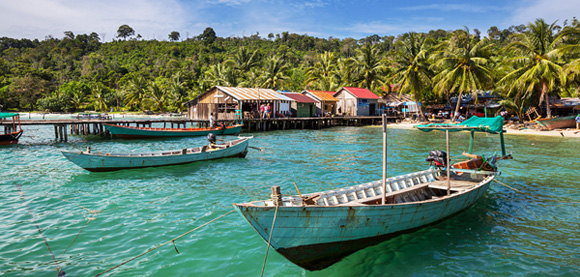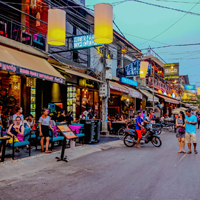Kampot, Cambodia
Last updated on Mar 10, 2025
Summary: Expats, digital nomads and retirees discuss what it is like to live in Kampot, Cambodia: Cost of living, Finding a home, Meeting People and more.

What do I need to know before moving to Kampot?
When we asked people what advice they would give someone preparing to move to Kampot, they said:
"Kampot is a small city known for its relaxed atmosphere, colonial architecture, and stunning natural beauty. Before moving there, expats should be aware that the local language is Khmer, although English is widely spoken in tourist areas. It's important to respect local customs and traditions, such as removing your shoes before entering someone's home and dressing modestly. The cost of living in Kampot is relatively low compared to Western countries, but it's still important to budget carefully. The local currency is the Cambodian Riel, but US dollars are also widely accepted. Healthcare facilities in Kampot are basic, so it's recommended to have comprehensive health insurance that covers medical evacuation. The climate in Kampot is tropical, with a rainy season from May to October and a dry season from November to April. It's advisable to prepare for high temperatures and humidity, as well as frequent rain during the wet season. Kampot is famous for its pepper plantations and salt fields, and it's also a great base for exploring the nearby Bokor National Park. However, it's important to be aware of potential safety issues, such as petty crime and road accidents. It's recommended to take precautions, such as not displaying valuable items in public and always wearing a helmet when riding a motorbike. The food in Kampot is a mix of traditional Cambodian cuisine and international dishes, with plenty of fresh seafood and tropical fruits. However, it's advisable to be cautious with street food and tap water to avoid potential health issues. Finally, it's important to have a valid visa to live in Cambodia. The process can be complex and time-consuming, so it's recommended to seek advice from a professional or from other expats who have gone through the process," wrote a member in Kampot.
How do I find a place to live in Kampot?
We asked expats how they chose their neighborhood and found a place to live. They answered:
"Finding a place to live in Kampot involves several steps. First, you need to decide on the type of accommodation you want. This could range from a simple room in a guesthouse, a serviced apartment, or a private house. Next, you should research online. Websites like Airbnb, Booking.com, and Agoda can provide a wide range of options for short-term stays. For longer-term rentals, websites like Khmer24 and IPS Cambodia can be useful. Social media can also be a great resource. There are several Facebook groups such as "Expats in Kampot" or "Kampot Noticeboard" where people often post about available rentals. Another option is to hire a local real estate agent. They can help you navigate the local market, negotiate prices, and handle paperwork. Once you've found some potential options, you should visit the places in person. This will give you a chance to check the condition of the property, the neighborhood, and proximity to amenities like shops, restaurants, and transportation. When you've decided on a place, you'll need to negotiate the terms of the lease, including the rent, deposit, and any other conditions. Make sure to get everything in writing. Finally, before moving in, it's a good idea to take photos of the property to document its condition. This can help avoid any disputes when you move out. Remember, finding a place to live in a foreign country can take time and patience, so it's a good idea to start your search well before you plan to move," commented one expat who made the move to Kampot.
What is a typical expat home or apartment like in Kampot?
"A typical expat home or apartment in Kampot, is often a blend of traditional Khmer architecture and modern Western conveniences. These homes are usually spacious, with open floor plans and high ceilings to help with the tropical heat. They often have large windows and balconies to allow for natural light and air circulation. The living areas are usually furnished with comfortable sofas and chairs, a dining table, and a television. The kitchen is typically equipped with modern appliances, including a refrigerator, stove, and sometimes a dishwasher. Bedrooms are usually air-conditioned and come with a bed, wardrobe, and sometimes an en-suite bathroom. Many expat homes also have a garden or a yard, providing a space for outdoor activities. Some even have a swimming pool. The homes are often located in safe, quiet neighborhoods, close to local markets, restaurants, and other amenities," said one expat in Kampot.
What is the average cost of housing in Kampot?
If you are thinking about moving to Kampot, cost of living in probably a key consideration. Expats commented about the cost of housing:
"The average cost of housing in Kampot can vary greatly depending on the type and location of the property. For a one-bedroom apartment in the city center, the monthly rent can be quite affordable. However, for larger properties or those located in more desirable areas, the cost can be significantly higher. It's also possible to purchase property in Kampot, with prices again varying widely based on factors such as size, location, and the condition of the property. Overall, compared to many Western countries, the cost of housing in Kampot is generally considered to be relatively low," remarked one expat living in Kampot, Cambodia.
Where should I setup a bank account in Kampot?
We asked expats in Kampot what banks they use and there advice about banking. They advised:
"Expats considering retirement in Kampot, should be aware of several key factors. Firstly, the cost of living is relatively low compared to Western countries, making it an attractive option for retirees. However, healthcare facilities may not be up to the standards that expats from developed countries are accustomed to. It's important to note that while English is spoken in many places, learning some basic Khmer, the local language, can greatly enhance your experience. The climate in Kampot is tropical, with a rainy season from May to October and a dry season from November to April. Expats should also be aware that they will need a retirement visa to stay in Cambodia long-term. This visa does not allow you to work, but you can live in the country year-round. Kampot is known for its relaxed atmosphere and beautiful natural surroundings, including the Bokor National Park and the Prek Kampot River. However, it's a small town, so it may not offer the same level of entertainment or amenities as larger cities. Safety can be a concern in Cambodia, so it's important to take precautions, such as avoiding isolated areas at night and being aware of your belongings at all times. Finally, it's crucial to respect local customs and traditions. Cambodia has a rich cultural history, and showing respect for local ways of life will help you integrate into the community," remarked one expat living in Kampot, Cambodia.
What do expats in Kampot appreciate most about the local culture?
"Expats in Kampot often appreciate the warm and welcoming nature of the local people. They are known for their friendliness and willingness to help, which makes settling in much easier. The relaxed pace of life is another aspect that expats enjoy. Kampot is a small town with a laid-back atmosphere, allowing expats to escape the hustle and bustle of city life. Expats also appreciate the rich cultural heritage of Kampot. The town is filled with French colonial architecture, traditional markets, and historic temples, providing plenty of opportunities to immerse oneself in the local culture. The local cuisine is another highlight for many expats. Kampot is famous for its pepper, and the food is a unique blend of Khmer and French influences. Finally, the natural beauty of Kampot is a major draw for expats. The town is surrounded by stunning landscapes, including the Bokor National Park and the Kampot River, offering plenty of opportunities for outdoor activities," remarked one expat living in Kampot, Cambodia.
"They do not seem to worry a lot & that rubs off over a period of time. They are more tolerant of each other & are quick to please & with a smile as I'm an older person that goes a long way," wrote one member in Kampot.
What do expats find most challenging?
"Language of cause & bribes that are paid to officials when you need to go through official channels," wrote a member in Kampot.
"Expats in Kampot often find the language barrier to be the most challenging aspect of the local culture, as not everyone speaks English and the Khmer language can be difficult to learn. The pace of life can also be a challenge, as it is much slower than what many Westerners are used to. Additionally, the lack of Western amenities and conveniences can be difficult for some to adjust to. The cultural norms and etiquette, such as the importance of saving face and not showing anger in public, can also be challenging for expats to understand and adapt to. Lastly, the heat and humidity can be physically challenging, especially for those not used to tropical climates," commented one expat who made the move to Kampot.
Is there a lot of crime in Kampot?
We asked people if there is a lot of crime. They answered:
"Kampot, is generally considered a safe city with a relatively low crime rate. However, like any other place, it is not entirely free from crime. Petty crimes such as pickpocketing, bag snatching, and other forms of theft can occur, particularly in crowded areas or tourist hotspots. Violent crimes are less common but not unheard of. It's also worth noting that there have been reports of scams targeting tourists. Therefore, while Kampot is generally safe, it's still important for residents and visitors to take standard precautions to protect their personal safety and belongings," explained one expat living in Kampot, Cambodia.
About the Author
 Joshua Wood, LPC is one of the Founders of Digital Nomad Exchange and serves as Co-President of Expat Exchange. Prior to Expat Exchange and Digital Nomad Exchange, Joshua worked for NBC Cable (MSNBC and CNBC
Primetime). Joshua has a BA from Syracuse and a Master's in Clinical and Counseling Psychology from Fairleigh Dickinson University. Mr. Wood is also a licensed counselor and psychotherapist.
Joshua Wood, LPC is one of the Founders of Digital Nomad Exchange and serves as Co-President of Expat Exchange. Prior to Expat Exchange and Digital Nomad Exchange, Joshua worked for NBC Cable (MSNBC and CNBC
Primetime). Joshua has a BA from Syracuse and a Master's in Clinical and Counseling Psychology from Fairleigh Dickinson University. Mr. Wood is also a licensed counselor and psychotherapist.
Some of Joshua's articles include Pros and Cons of Living in Portugal, 10 Best Places to Live in Ireland and Pros and Cons of Living in Uruguay. Connect with Joshua on LinkedIn.
 Digital Nomad Visa in Cambodia
Digital Nomad Visa in Cambodia
Find essential information about the digital nomad visa for working in Cambodia.
![]() Cambodia Forum
Cambodia Forum
Talk with other digital nomads and expats in Cambodia on our Cambodia forum - meet people, get advice and help others.
![]() Contribute
Contribute
Help others in Cambodia by answering questions about the challenges and adventures of living in Cambodia.
Digital Nomads in Cambodia offer advice about healthcare, hospital visits, emergency rooms visits, finding a doctor and buying health insurance in Cambodia.



